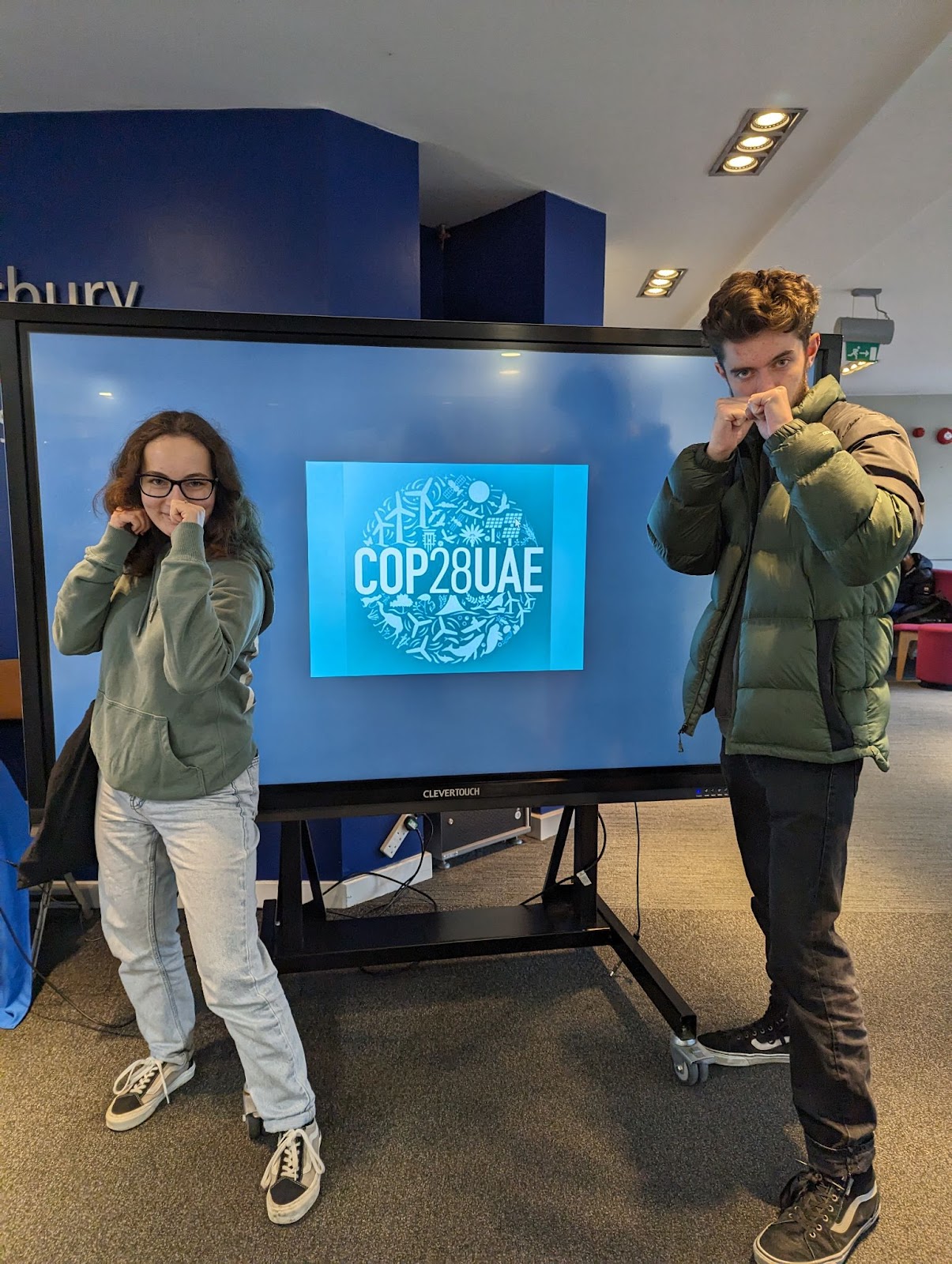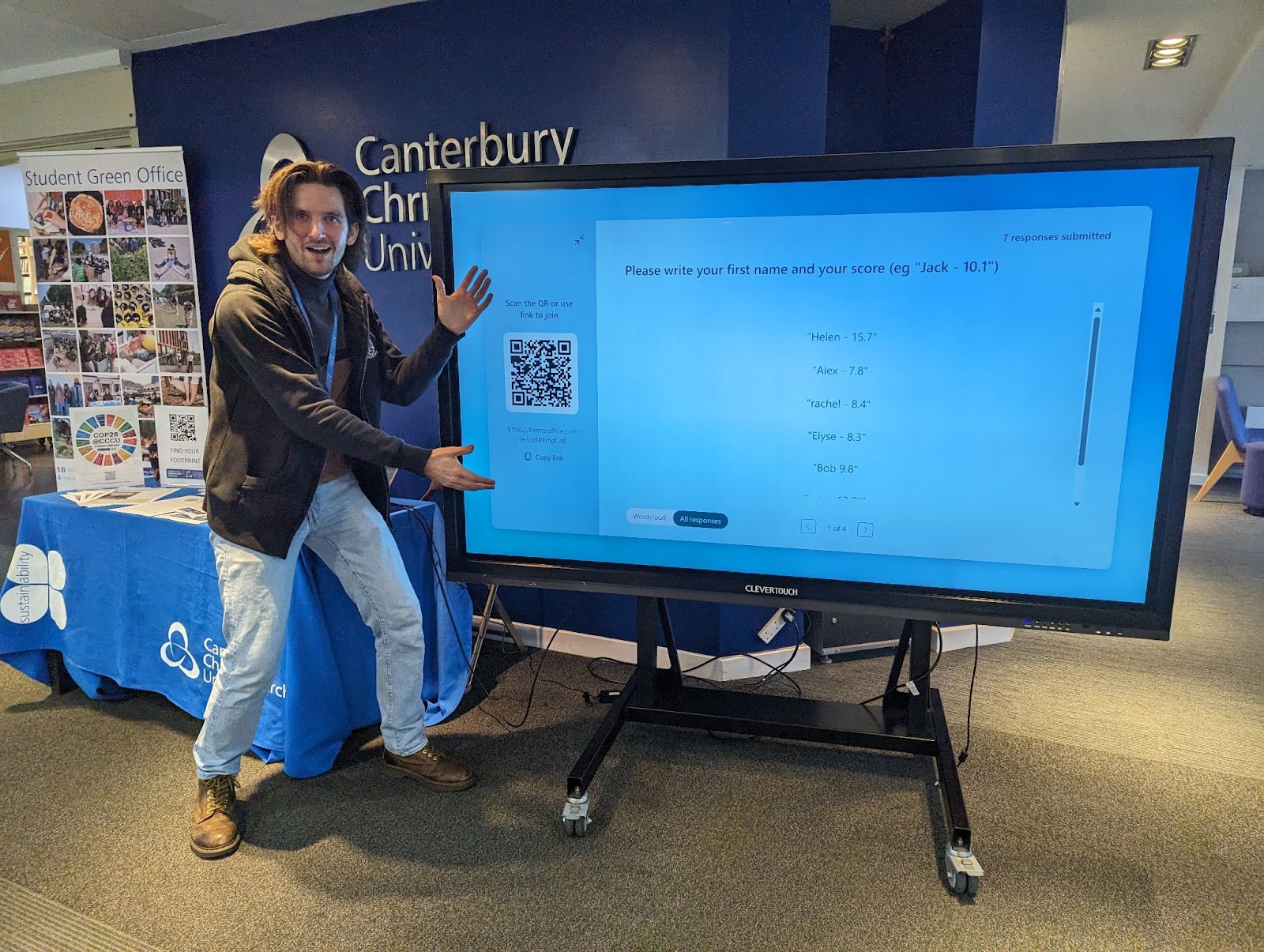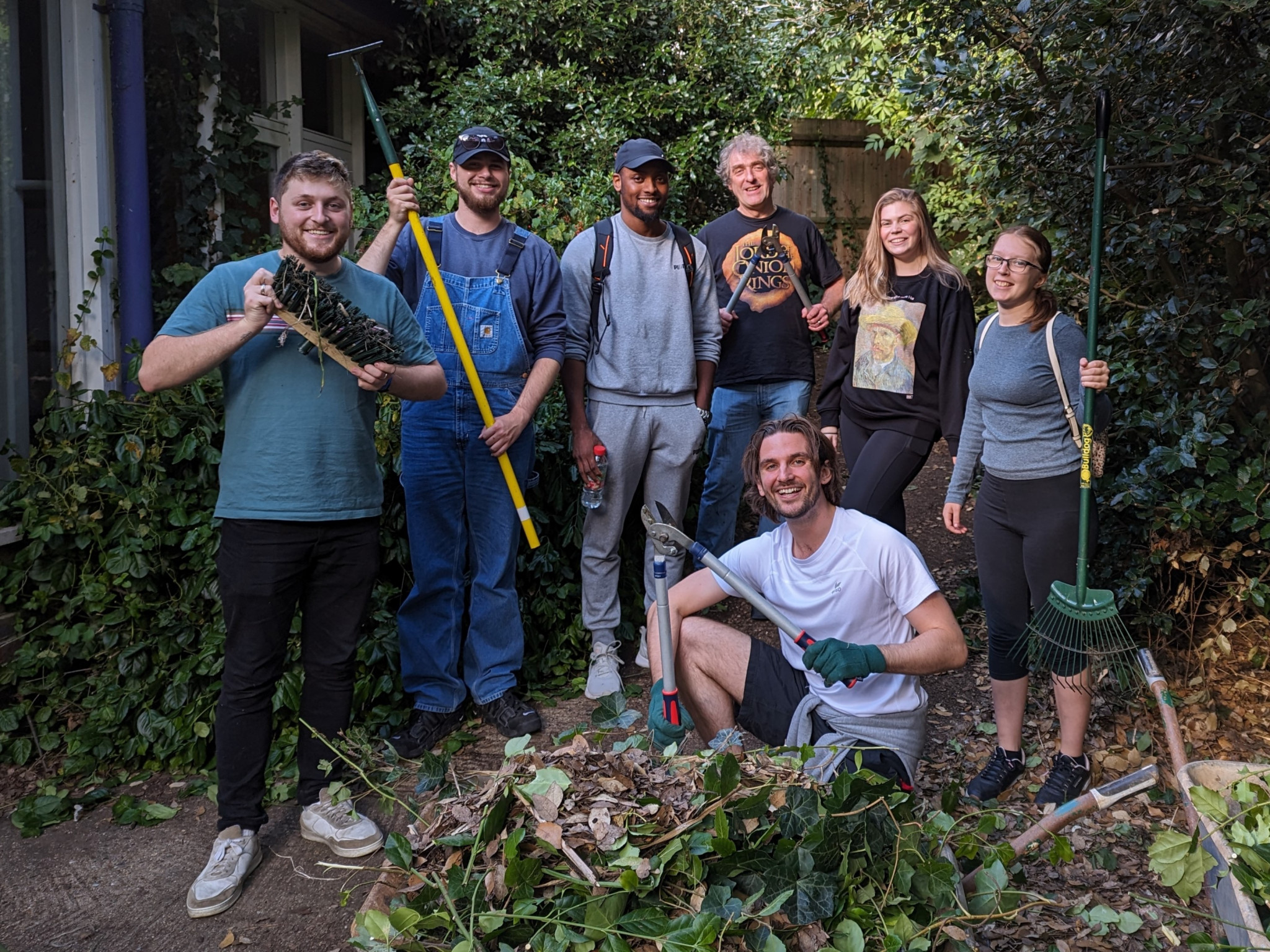As a student on teaching placement, my work with the Student Green Office has been my main point of connection with campus life – and what a year it’s been. I’ve had the chance to run all sorts of exciting events, develop professionally, and leave behind a series of achievements and projects that I can point to. Here are three highlights from my work – but I’d strongly encourage you to also read the reflections of Jenny, Halle, and Harry, to see the range of projects our team has embarked upon this year.
Cop28: carbon footprints and student engagement


Image Description: Left – showcasing the leaderboard; right – my pals Kat and Nate from CCCU Boxing square up to climate change
All eyes were on Dubai for 2023’s Conference of the Parties 28, hoping for a breakthrough agreement on fossil fuel phaseout. While world leaders were engaged in urgent debate, the SGO team was doing our part to draw attention to these important affairs on campus.
My job – along with my colleague Harry, and a team of volunteers – was to run a carbon footprint leaderboard stall in the central Touchdown cafe. This was a big success: using the WWF Footprint Calculator, we engaged over 40 staff and students in conversations about how our emissions are linked with our lifestyles. To incentivise engagement, all participants were entered into a raffle. The event also generated valuable data where we discovered the average annual carbon footprint of a CCCU student (9.9 tons).
Carbon Literacy Training: becoming a facilitator
Image Description: My first Carbon Literacy Training cohort
The whole reason I came to CCCU was to get a teaching qualification, so that I could find a way to run training within the world of sustainability. So when I discovered the Carbon Literacy Training programme, it was a no-brainer: I had to get involved.
Thanks, in particular, to John Hills, I had loads of opportunities to dip my toe into this world. I started by shadowing sessions, but later co-delivered them with John, and by March I ran an entire session myself. John, along with the rest of the ASF team, also supported me to attend the Carbon Literacy Trust’s train-the-trainer programme. As a result I am officially qualified as a level 1 Carbon Literacy facilitator. With this skillset I can deliver it in any future organisations I work with and even start to build up the delivery of the programme to external partners on a commercial basis.
Alongside the main CLT programme, I also contacted lecturers from across the university to organise 1-hour ‘Introduction to Carbon Literacy Training’ sessions. These were then delivered by myself, John, or our other colleague, Bethany Climpson. I’m delighted to say that as a result of this we ended up reaching over 100 students from across the university. Somehow, one of the lecturers even turned the tables on me by folding the Intro to CLT training into her model UN conference – and press-ganged me into playing the UN Secretary General. There’s career progression for you!
Teaching Transformations: a podcast project
Image Description: Interviewing Dr Ken Fox for the Teaching Transformations podcast
By far the most involved – but also most rewarding – project was a series of interviews I have conducted over the year, leading to a filmed podcast entitled ‘Teaching Transformations’. This podcast interviews lecturers and course leaders from across the uni about how they have embedded sustainability into their curriculums.
I organised a small pilot recording with Zulfi Ali in November, but it wasn’t until May that we managed to get the full series complete. Lecturers have very busy calendars! But once everyone was in the podcast studio, the conversations that resulted were fascinating. I was impressed and inspired by the creativity and thoughtfulness our lecturers have deployed to bring sustainability into focus within their teaching areas. From a three-year iterative programme in the Politics school, to using hospital sustainability as a case study for radiography’s Leadership in Medicine module, staff have found all sorts of opportunities to expose students to the biggest challenge of our civilisation. Suffice it to say, there’s plenty of good practice that other colleagues can draw on – and I’m pleased to have delivered the podcast as a repository for this knowledge. I hope that it will prove useful to teaching colleagues as they embed sustainability as part of CCCU’s Vision 2030 programme; the interviews will begin publishing at the end of summer.
The project owes its success to my colleague Harry, along with a big volunteer team of film students, audio designers, and collaborators from the Careers and Enterprise Team. Without their help (and flexible schedules), this would have been impossible.
Improvements, next steps, and final thoughts
There’s always room for improvement. Here are three areas where I’d love to have gone further (and perhaps could leave as a call-to-action for next year’s SGO):
- Engage with students in private halls about recycling rates, which are very poor compared to university-run halls. A major student housing provider in Canterbury does not even separate its waste bins, leading to contamination and unnecessary landfill. We had the seeds of a campaign this year although it never quite took off.
- Contacting every lecturer, offering to deliver the Introduction to Carbon Literacy Training. We targeted a small number of under- and postgraduate courses – but there are 95 undergrad courses at the uni alone; plenty of opportunity to roll out this important message (and to promote engagement with the full version of the Carbon Literacy Training).
- Delivering student consultation on the Academic Framework and Curriculum Review processes – particularly around embedding sustainability and green skills. For some reason, university leadership has proved reluctant to reach out to students about these processes this year, and this is an unfortunate missed opportunity: the Student Green Office is perfectly-placed to drive this kind of engagement.
But I cannot fault the support of Bethany and Felicity from the SGO team, nor the wider Academy for Sustainable Futures. They have been focused on professional and pastoral support at every step of the way. The tone has always been ‘how can being an SGO add to your studies?’ and never making you feel like there’s a conflict between your uni work and this job. Thanks as well to Halle, Jenny, and Harry, for getting Tuesday mornings off to a great start every week this year. It’s been an amazing opportunity.
I’m excited for my next steps: I’m keen to take my Carbon Literacy facilitator qualification into the Further Education sector alongside my new professional teaching, and I’m excited to be able to point to the Teaching Transformations podcast to show my development as a subject specialist in sustainability education. I would not have had these opportunities without the Student Green Office, and strongly recommend anyone interested in their own development in this area apply to work with them next year.
By Jack Swan, SGO Project Officer
Want to read more? Halle’s SGO reflection blog is here.
 Sustainability
Sustainability Bethany Climpson
Bethany Climpson 803
803


